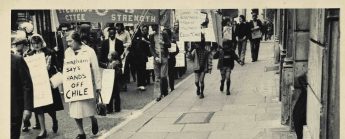To fit with the desert island theme, we asked everyone to list their favorite album. Some continued with the Modern British theme whilst others gave much more personal responses, relating to memories of their adolescence or their time as undergraduates. Some refused to admit their choices in public; rather wisely perhaps as one member admitted to listening to grindcore remixes of Jedward’s entry for the eurovision song contest. We have stuck some links in case anyone wants to listen to a track….
Here is the MBS album list:
The Rolling Stones, Exile on Main Street (1972)
Bob Dylan, Blood on the Tracks (1975)
Gil Scot Heron & Brian Jackson, The First Minute of a New Day (1975)
Elvis Costello and the Attractions, Armed Forces (1979)
The Clash, London Calling (1979)
Robert Wyatt’s version of Shipbuilding (1982) – a single, we know, but one that fits in with our modern British history theme.
Peter Maxwell Davies, Black Pentecost (1993)
(We could not find a clip of this – Sorry!)
The Smiths, Hatful of Hollow (1994)
Tricky, Maxinquaye (1995)
Mogwai, Young Team (1997)
Radiohead’s OK Computer (1997)
Bonnie ‘Prince’ Billy, I see a Darkness (1999)
Hefner, The Fidelity Wars (1999)
Toumani Diabate, Symmetric Orchestra’s Boulevard de l’Independence (2006)
‘Allo Darlin by ‘Allo Darlin (2010)
And, after choosing an ‘irritatingly obscure album’ (we’ll let you decide which one that is), one member of MBS stated that their favorite album ‘would (obviously) be Melt Banana’s, 13 Hedgehogs (2005)…’
Still not entirely sure whether there are hints of sarcasm here, but in the name of academic freedom, we list it here but leave the passing of any judgment to the reader. That said, at least two members of MBS have seen Melt Banana live…..






